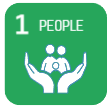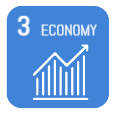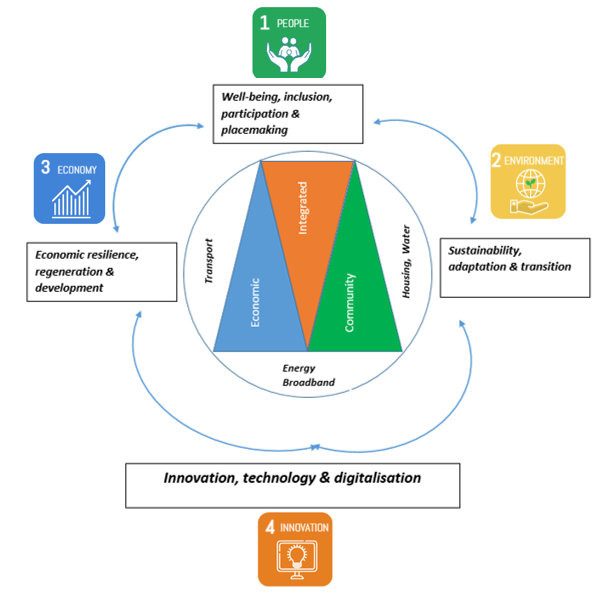4.1 Strategic Vision and High-Level Goals
Against this backdrop, the strategic vision for the LECP is:
|
To create healthy resilient communities with good infrastructure and services and a resilient sustainable economy providing quality jobs and decent incomes for people. Households, communities and businesses are supported to adapt to the green transition and sustainable living. Equality, civic participation and social inclusion are promoted in a diverse and multi-cultural Limerick where people and places are connected to each other. Drawing on innovation and creativity, our communities find solutions to challenges and Limerick continues to build its attractiveness and reputation in the regional, national and international context. |
This vision is supported by four High Level Goals which are shown in the Figure below. These High Level Goals are further elaborated in Sustainable Community Development Objectives, Sustainable Economic Development Objectives and Integrated Objectives.
The High-Level Goals interact with and work off each other. This reflects the dynamic quality of the LECP as a framework plan. This framework is comprehensive in its scope and adaptive to changing conditions.
The High Level Goals are:
-
 HLG1: People & Community - Well-being, inclusion, participation & placemaking. To achieve health and well-being for all, progress social inclusion by reducing poverty and exclusion, progress equality, increase civic participation including volunteering and community initiatives in our more diversified and multi-cultural society, grow civic leadership and promote placemaking to create safe and sustainable urban and rural communities in Limerick.
HLG1: People & Community - Well-being, inclusion, participation & placemaking. To achieve health and well-being for all, progress social inclusion by reducing poverty and exclusion, progress equality, increase civic participation including volunteering and community initiatives in our more diversified and multi-cultural society, grow civic leadership and promote placemaking to create safe and sustainable urban and rural communities in Limerick.
-
 HLG2: Environment & climate action – Sustainability, adaptation & transition. To promote sustainable communities and economy working towards carbon neutrality. This means making adaptions to the way we live and conduct economic and commercial activities and taking measures to respond to climate change. It also means preparing for sustainable living through education and skills training and taking advantage of new opportunities for jobs, enterprise and investment in “green” sectors and gaining benefits from more efficient energy systems and energy generation from renewable sources.
HLG2: Environment & climate action – Sustainability, adaptation & transition. To promote sustainable communities and economy working towards carbon neutrality. This means making adaptions to the way we live and conduct economic and commercial activities and taking measures to respond to climate change. It also means preparing for sustainable living through education and skills training and taking advantage of new opportunities for jobs, enterprise and investment in “green” sectors and gaining benefits from more efficient energy systems and energy generation from renewable sources.
-
 HLG3: Economic resilience, regeneration & development. To promote a strong and resilient local economy with a diversified base, create additional and sustain quality jobs, increase the numbers in work and access to jobs by those in economic exclusion and achieve compact growth and vibrant living communities in our city, towns and villages. This means bringing more investment to Limerick, generating new and building competitive enterprises, retaining and attracting talent in terms of educated people and the skills, investing in sustainable regeneration and development of the physical fabric of the city and town and village settlements in rural Limerick.
HLG3: Economic resilience, regeneration & development. To promote a strong and resilient local economy with a diversified base, create additional and sustain quality jobs, increase the numbers in work and access to jobs by those in economic exclusion and achieve compact growth and vibrant living communities in our city, towns and villages. This means bringing more investment to Limerick, generating new and building competitive enterprises, retaining and attracting talent in terms of educated people and the skills, investing in sustainable regeneration and development of the physical fabric of the city and town and village settlements in rural Limerick.
-
 HLG4: Innovation, technology & digitalisation. To promote innovation in our economy, society and local communities finding solutions to major challenges and enhancing our competitiveness. This includes creating opportunities for the wide application of innovation and creativity, expanding the application of technology and digitalisation to strengthen our economy and improve access to quality services for people, taking measures to make these technologies and digital services accessible to all.
HLG4: Innovation, technology & digitalisation. To promote innovation in our economy, society and local communities finding solutions to major challenges and enhancing our competitiveness. This includes creating opportunities for the wide application of innovation and creativity, expanding the application of technology and digitalisation to strengthen our economy and improve access to quality services for people, taking measures to make these technologies and digital services accessible to all.

The Sustainable Community Development Objectives (SCDOs), Sustainable Economic Development Objectives (SEDOs) and the Integrated Objectives are developed with reference to the HLGs.
The HLG have a thematic focus – HLG1 People & Community; HLG2 Environment & Climate Action; HLG3 Economic Resilience & Regeneration; underpinned by HLG4 Innovation, Technology & Digitalisation – but actions in the separate elements of the LECP cross-cut all of the HLGs. Each HLG is relevant to Economic, Community and Integrated elements of the LECP.
Local objectives under the LECP are supported by main areas of government policies and core local authority functions in: Housing, Water Services and Water Infrastructure, Energy systems / Energy generation / Energy networks, Broadband / the National Broadband Plan, Transport (roads, rail, airports / connectivity infrastructure) as well as essential public social infrastructure in Housing, Health (hospital, health centre) and Education (colleges, schools). These broader national sectoral policy frameworks and public investment are needed to achieve the local goals, as set out in the LECP.
LECP objectives are delivered under other separate strategies and action plans of the local authority. These include:
- Limerick Development Plan 2022-2028
- Limerick City and County Council Housing Strategy 2021
- The Limerick Shannon Metropolitan Area Transport Strategy 2022
- Limerick City and County Council Climate Action Plan (in development)
- Limerick Tourism Development Strategy and Action Plan 2019-2023
- Limerick Cultural and Arts Strategy (new strategy in development)
- Limerick City and County Council Digital Strategy 2017-2020
- Limerick Rural Development Strategy incorporating LEADER 2016-2020
- Limerick 2030 Economic and Spatial Strategy (updated 2022)
- Limerick Regeneration Framework Implementation Plan 2013-2023
- Limerick City and Environs Greenway and Blueway Infrastructure Strategy (in development)
- Limerick Age-friendly Strategy (new strategy in development)
- Belonging to Limerick – Limerick City and County Integration Plan 2019-2023
- Regional Enterprise Plan to 2024 – Mid-West
- Learning Limerick Strategic Plan 2018-2022
- Retail Strategy for Limerick – Shannon Metropolitan Area and County Limerick 2022 –2028
The LECP development and implementation applies the following principles:
- Public sector equality and human rights duty: meaning that the local authority is committed to eliminating discrimination, promoting equality of opportunity and protection of human rights to whom services are provided and staff of the local authority
- Inclusive participation in the preparation of the LECP framework plan and implementation plans and reviews of implementation including consultations with groups that are not traditionally involved in such processes
- Collaborative partnerships with stakeholder groups across the public, voluntary and community sector and business and sectoral interests (e.g., environment, farming community, rural and urban).